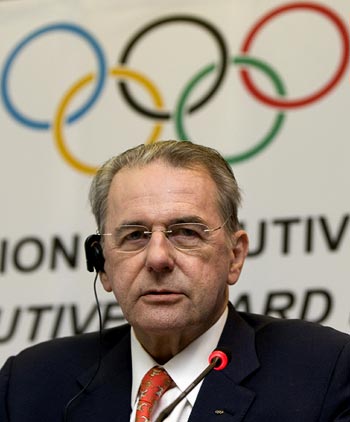 Jacques Rogge was re-elected as president of the International Olympic Committee (IOC) for a second term until 2013 on Friday.
Jacques Rogge was re-elected as president of the International Olympic Committee (IOC) for a second term until 2013 on Friday.
Rogge, who ran unopposed, took over in 2001 from Juan Antonio Samaranch as the eighth president of the IOC since the organisation was founded in 1894, two years before the first modern Games in Athens.
"We have accomplished a lot together. I am proud of our record of accomplishment for the past eight years," the 67-year-old orthopaedic surgeon said after winning 88 of the total 92 votes. There was one vote against Rogge and three abstentions.
IOC presidents can only serve a maximum 12 years, with an eight-year first term and four-year second term.
"We will continue to deliver outstanding Games, we will safeguard and strengthen our assets. We will be staunch allies for the athletes and continue the fight against doping."
Rogge took over the IOC at a sensitive time when the organisation was wounded by the Salt Lake City 2002 Games corruption scandal involving bribes in return for votes from members.
Several IOC members were forced out and others reprimanded in an affair that damaged the credibility of the IOC.
Rogge presided over his first Games as IOC chief in Salt Lake City and at his first summer Olympics in Athens four years ago.
He also presided over the Turin 2006 and Beijing 2008 Olympics. He will be in charge of the Vancouver winter Olympics in 2010 with the London 2012 summer Games his last.
"We are in a good position with the unity within the IOC," Samaranch told the IOC session. "We will be more important in the future," he said, congratulating Rogge.
Rogge has led the IOC's tough stance against doping in sport calling for stiffer sentences, more tests and pursuing the athletes' entourage to stamp out illegal drug taking that has repeatedly marred top performances at the Games.
The soft-spoken Belgian is also responsible for creating the Youth Olympic Games, a tool aimed at attracting a new generation of future Olympians and a younger global audience.
Rogge has a 40-year involvement with the Olympics, as a sportsman, a national Olympic team official and as an IOC member since 1991.
He also competed in three editions of the Games as a yachtsman from 1968 to 1976 and played rugby for Belgium.






